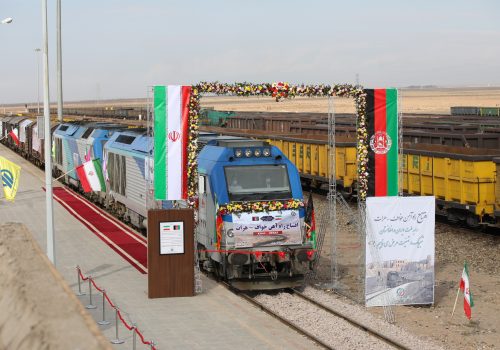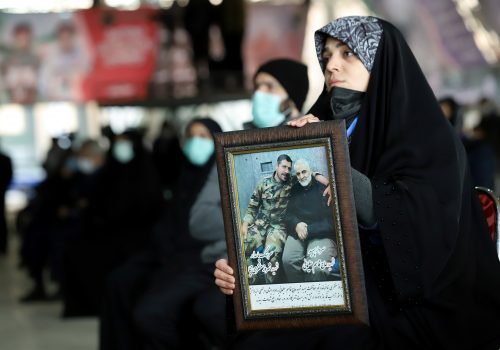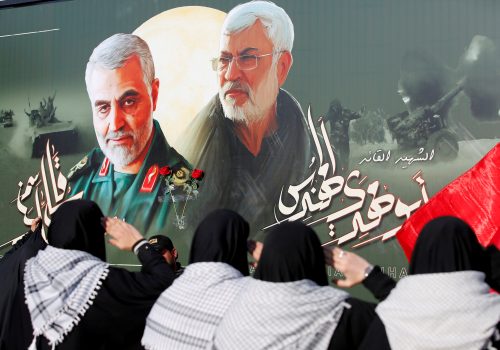FAST THINKING: What’s Iran thinking?
JUST IN
Something tells us the Iran story is not going to stay quiet as President-elect Joe Biden’s inauguration approaches on January 20. Still reeling from the recent assassination of one of its leading nuclear scientists and fresh off the anniversary of Qassem Soleimani’s killing, Tehran seems to be lashing out. It seized a South Korean tanker earlier today while also announcing that it had begun increasing its uranium enrichment levels to 20 percent—blowing past the limits set in its 2015 nuclear accord with the United States and other world powers. But there’s a strategy behind the moves, the Atlantic Council’s Barbara Slavin tells us. Let’s break it down.
TODAY’S EXPERT REACTION COURTESY OF
- Barbara Slavin: Director of the Future of Iran Initiative
What’s Iran up to with the enrichment?
- In a sense, Tehran is already negotiating with the American president-to-be. “Iran is seeking leverage,” Barbara tells us, “to make sure Biden comes back into compliance” with the Iran deal after Donald Trump’s withdrawal—and that Biden “lifts sanctions sooner rather than later.”
- Could it work? It will at least add pressure—because, as Barbara points out, the clock is suddenly ticking: “The longer Biden waits, the more 20 percent-enriched uranium Iran will have and the closer it will be to ‘breakout’—possession of sufficient fissile material to make nuclear weapons.”
- The enrichment, she notes, could easily play into US-Iran talks over a potential return to the nuclear accord and the lifting of Trump-era sanctions: “The buildup in uranium stockpiles can be rapidly reversed if Biden keeps his promise to return to the [nuclear accord].”
And why seize the tanker?
- What Iran wants, Barbara says, is “access to hard currency oil revenues frozen in South Korean banks because of US sanctions.” She calls the seizure “a way to put pressure on Seoul to put pressure on Biden.”
- And it’s in keeping with the strategy Iran is deploying with its game of nuclear chicken. “This is all a classic bank shot by the Iranians,” Barbara says, noting that Iran took a similar approach after the Soleimani killing. The goal is to stop short of forcing a US military response while “showing all the same that it has potent cards to play.”
Your move, Team Biden
- “Biden will not directly contact Iran before he becomes president,” Barbara notes, “but he has already telegraphed his intentions through his national security advisor, Jake Sullivan. Sullivan told CNN on Sunday that the US wants to return to the [nuclear deal] but also talk about other issues, including ballistic missiles, in subsequent negotiations.”
- She adds that while “Biden’s camp will not be happy about the latest Iranian moves, it will not be surprised by them.” She expects Biden to have Sullivan reach out to Iran soon after inauguration—while also working with America’s European allies “to design a sequence of mutual steps back into compliance” with the nuclear deal.
Further reading
Mon, Jan 4, 2021
Iran’s railway ambitions go beyond Afghanistan
IranSource By
The first railway between Iran and Afghanistan was launched in December 2020. The project represents a major step toward increasing Afghan-Iran trade and opening landlocked Afghanistan to the rest of the world through the Iranian port of Chabahar.
Fri, Jan 1, 2021
The Qasem Soleimani assassination feels like ages ago—but Iran hasn’t forgotten
IranSource By Holly Dagres
A year after Quds Force commander Qasem Soleimani’s death, Iranians haven’t forgotten—and the Iranian government will make sure that they don’t.
Fri, Jan 1, 2021
Soleimani assassination failed to re-establish ‘deterrence’ against Iran
IranSource By Barbara Slavin
The threat of a wider war between the US and Iran remains as both the Trump administration and Israel have recently deployed more assets to the region including submarines, aircraft carriers and B-52 bombers.
Image: IRGC / WANA (West Asia News Agency) via REUTERS


